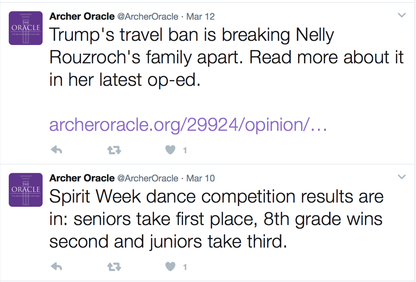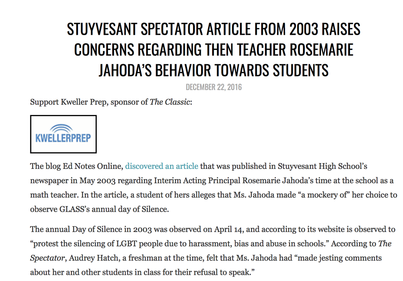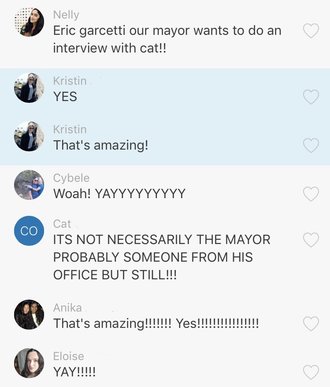 Two recent posts from my student journalists' news site Twitter. They use social media to share recently published stories and report on breaking news. Two recent posts from my student journalists' news site Twitter. They use social media to share recently published stories and report on breaking news. Social media has had such a profound effect on journalism that it's sometimes hard to remember how traditional news functioned before it. Reading this 2009 MediaShift article is a powerful reminder that Twitter wasn't always the source of breaking news. In fact, as author Julie Posetti wrote just eight years ago, "Some employers are either so afraid of the platform or so disdainful about its journalistic potential that they've tried to bar their reporters from even accessing Twitter in the workplace." Not accessing Twitter in the newsroom? It's laughable now. Yet for some high school newsrooms, this is still the case.
1 Comment
 A screenshot of one of the stories reported by Townsend Harris High School's student newspaper, The Classic. Acting as watchdog journalists, these student journalists have written a series of stories about the controversy surrounding the school's interim principal, Rosemarie Jahoda. A screenshot of one of the stories reported by Townsend Harris High School's student newspaper, The Classic. Acting as watchdog journalists, these student journalists have written a series of stories about the controversy surrounding the school's interim principal, Rosemarie Jahoda. One of the most important roles of a free press in a journalistic society is to act as a watchdog, to keep an eye on those in power and to ensure that power is not being misused. Although this role is more prominent among professionals, student journalists willing to put in the necessary time and research can be powerful watchdogs for their communities. In his Poynter article "Watchdog Culture: Why You Need it, How You Can Build it," Butch Ward describes a 2005 conference for media professionals and public service journalism organizations about the importance of creating a watchdog culture in newsrooms.  This screenshot from a GroupMe message exchange with my student editors earlier this week is giving me life. It happened after one of them secured an interview with LA Mayor Garcetti's office to talk about the recent low voter turnout for the LA municipal election. This screenshot from a GroupMe message exchange with my student editors earlier this week is giving me life. It happened after one of them secured an interview with LA Mayor Garcetti's office to talk about the recent low voter turnout for the LA municipal election. Journalism isn't sexy anymore. That's the concern I hear from many when contemplating the future of this crucial profession. Veteran reporter and editor Bob Collins wrote about this problem in a 2012 News Cut piece for Minnesota Public Radio. Collins remembered a time when aspiring young journalists flooded NPR World Headquarters, eager to explore a career in news, and he contrasted this to reporter Trisha Marczak's experience going to a high school career fair and finding not a single student interested in her work. "I at least expected to meet one eager, young student with their eyes set on changing the world through their pen (that’s how I felt at that age)," Marczak writes. "Don’t these students watch movies? You have to admit; reporters are a movie character favorite. They may not always be small town editors, but you get the idea. Throughout the day, when explaining to students what I do, exactly, I also began to ask whether any of their schools had student-run newspapers. Not one." And this, I believe, is the problem. How do students get interested in careers? Exposure. "Are some of the newsroom's most prized values contributing to journalism's continuing decline in credibility?” Tim Porter poses this question in his 2005 essay “New values for a new age of journalism.” He outlines “old” values (including competition, speed and individualism) and argues these concepts must be replaced with new values (such as context, discipline and collaboration) more reflective of the information age.
Written before the advent of the iPhone and social media, Porter’s essay now seems oddly prescient. It was hard to get the “scoop” on breaking news in 2005, but it’s nearly impossible in 2017 when anyone can Snap, Tweet or FacebookLive an event as it happens. As I discussed in my previous post, what brings value to good journalism — whether professional or scholastic — is context, depth and verification. This also provides a starting point for a discussion of “fake news.” |
About“And though she be but little, she is fierce!” -A Midsummer Night’s Dream Archives
December 2020
Categories
All
|

 RSS Feed
RSS Feed